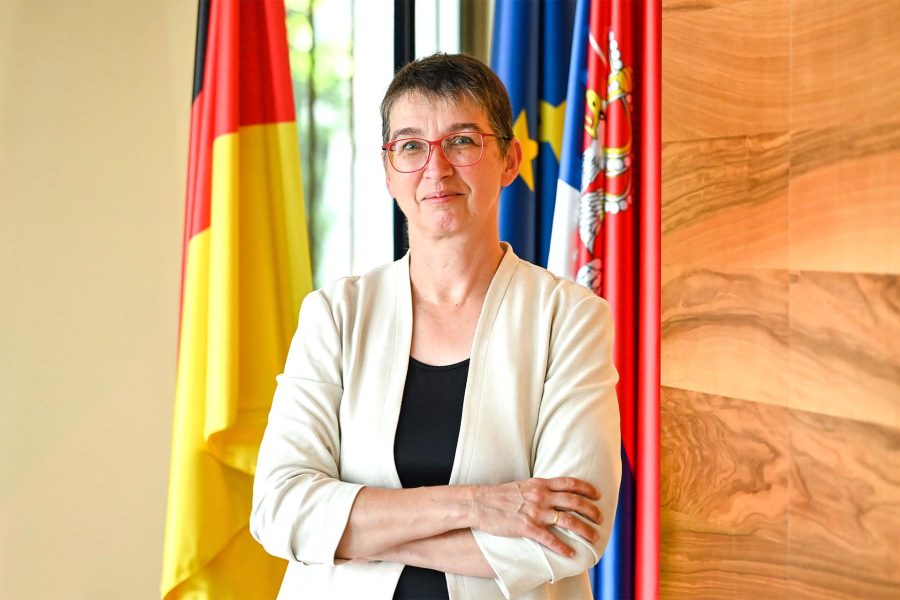With the reform of the German citizenship law, the country’s federal government intends to create a modern immigration law that reflects the diversity of Germany as a society and modern country ~ Anke Konrad
The Berlin process, as well as the Franco- German proposal for the final normalisation of relations between Belgrade and Pristina, should be interpreted as Germany’s contribution to accelerating the process that ought to lead to Serbia’s EU accession, says German Ambassador Anke Konrad in this interview for CorD Magazine. She adds that economic cooperation between the two countries remains at a high level, as does interest in entering Serbia among German companies.
“Of course, the business environment needs to be fair and lawful,” insists Ambassador Konrad, before noting that “the most recent business survey of the German Chamber of Commerce in Serbia, conducted in 2023, has testified that factors like the availability of qualified workers, the fight against corruption, political and social stability, as well as the transparency of public tenders, have an important impact on the productivity of existing investments, as well as decisions on future ones. It is therefore crucial to continue working to ensure a level playing field for all players in the business sphere.”
Your Excellency, when you arrived in Serbia a year ago, your initial message was that Serbia is an important partner to Germany. Has anything changed in the meantime when it comes to relations between Berlin and Belgrade?
– Relations between Berlin and Belgrade are close and will remain so. Through my first year in Serbia, we have continued our cooperation on a broad range of bilateral issues, as well as on global challenges like, for instance, climate change. The Berlin Process, created in 2014, has taken a big step forward with the conclusion of four mobility agreements that will contribute to furthering cooperation and exchange among all Western Balkan countries mutually, as well as with their European partners. We look forward to the next summit in Tirana, on 16th October, which should open up new avenues for this cooperation.

With the Franco-German proposal, Berlin and Paris have provided an important contribution to agreements reached in Brussels and Ohrid at the beginning of this year to further the normalisation of relations between Belgrade and Pristina. We also see our engagement in all these areas as our contribution to advancing Serbia on its journey to membership in the European Union and we will continue our support.
German media recently received a letter in which several Western politicians, including Michael Roth, Chair of the Bundestag Foreign Affairs Committee and a member of the ruling SPD, allegedly call on the EU and the U.S. to distance themselves from Serbia and support the Kosovo government over current events unfolding in the north of the province. The letter includes a call to “learn from our past and ensure that we do not pursue Belgrade-centric policies in the Balkans”. Is this the personal position of Mr Roth or is he actually announcing a change to German foreign policy?
– The role of the German Foreign Affairs Committee is to monitor and evaluate our foreign policy. The committee may provide the government with advice and recommendations on foreign policy, stemming from discussions and analyses that take place there.
The Ohrid Agreement, is an important and responsible step towards normalisation that we support and which must now be implemented by both sides without additional conditions
The letter therefore represents an impetus for public debate and does not signify a change in German foreign policy. Our position remains clear: the future of the Western Balkan countries lies in the European Union. To this end, Serbia and Kosovo will have to take important steps toward one another. They confirmed their willingness to do so six months ago in Ohrid – the task for both sides now is to implement those commitments.
In your statements given to media here in Serbia, you refuted the claim that Germany “supports only one side” in Kosovo. To which side do you attribute responsibility for the latest escalation of problems in the north of Kosovo?
– We have a situation between Serbia and Kosovo that is not sustainable and that has been depriving both countries, and the people who live there, of many development prospects for many years. The basic agreement, namely the Ohrid Agreement, with which both sides agreed earlier this year to further normalise their relations, is therefore an important and responsible step that we support and which must now be implemented by both sides without additional conditions.

It is now the responsibility of both sides to conduct and continue the dialogue on the implementation of Ohrid seriously and constructively, and to take concrete steps. We should always bear in mind that the normalisation of these relations is, first and foremost, about the future of the people of the two countries, as well as the future of the entire Western Balkan region.
Late June saw German company Hansgrohe open its new plant in Valjevo, announcing work for as many as 100 workers. Does this serve to confirm that German investors are still interested in investing in Serbia?
– Yes, interest in investing in Serbia remains high among German companies, including investments in the expansion of existing companies or the diversification of their portfolio. I would like to emphasise that these investments lead not only to the creation of additional workplaces, but also highly qualified ones, creating new prospects for specialists, also in the IT sector. By setting new standards with regard to working conditions, dual education, environmental protection or energy consumption, German companies contribute directly to Serbia’s EU accession path.
By setting new standards with regard to working conditions, dual education, environmental protection or energy consumption, German companies contribute directly to Serbia’s EU accession path
Of course, the business environment needs to be fair and just. The most recent business survey of the German Chamber of Commerce in Serbia, conducted in 2023, testified that factors like the availability of qualified workers, the fight against corruption, political and social stability, as well as the transparency of public tenders, have an important impact on the productivity of existing investments, as well as decisions on future ones.
It is therefore crucial to continue working to ensure a level playing field for all players in the business sphere.

Germany is viewed from within Serbia as an EU member state that strongly supports expansion of the Union to encompass the countries of the Western Balkans. Given the current pace at which this process is unfolding – not only in the case of Serbia, but also with Montenegro and particularly North Macedonia – does any basis exist to believe that expansion is a realistic option in the near future and on what does that depend?
– The enlargement of the EU remains our goal. This includes Serbia, as well as all other countries of the Western Balkans. That’s why we continue to support Serbia’s efforts on this challenging path. And that’s why we are simultaneously also working on the future of the EU.
Will the German public support the government’s initiative to significantly ease the procedure for obtaining citizenship, including the option of dual citizenship, which is a topic of interest to a large number of German citizens with Serbian roots who do not yet have a permanent status solution?
– With the reform of the German citizenship law, the federal government intends to create a modern immigration law that reflects the diversity of our society and modern country. The draft law envisages that, in the future, foreigners who are able to make a living for themselves will be able to apply for naturalisation after only five years resident in Germany. Moreover, they will not have to give up their original citizenship. Of course, this would also benefit Serbian citizens who have lived in Germany for a very long time and who are well integrated. The draft law will have to pass the German Bundestag, and therefore might be subject to change following discussions between the members of the parliament. It is not yet clear when the new law might enter into force.
| EU Our position remains clear: the future of the Western Balkan countries lies in the European Union | INVESTMENTS Interest in investing in Serbia remains high among German companies, including investments in the expansion of existing companies or the diversification of their portfolio | ENLARGEMENT The enlargement of the EU remains our goal. This includes Serbia, as well as all other countries of the Western Balkans |
|---|